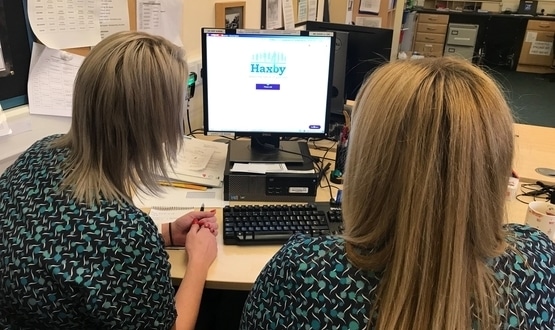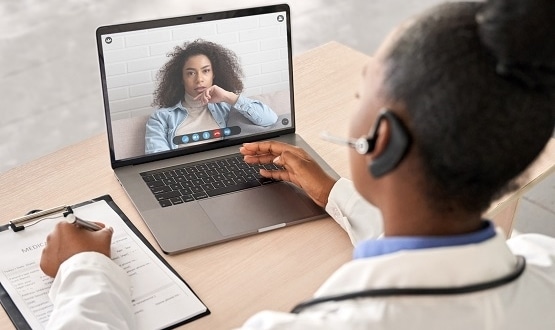One year later: How online triage has changed the face of general practice
- 25 March 2021

Dr Thomas Patel-Campbell shares the experiences of Haxby Group GP practices after 12 months of using online triage and patient flow management technology.
Early in 2020 we went live with online triage technology across six of Haxby Group’s surgery sites in York. We are now using it successfully at our 13 GP surgeries and the 90,000-plus patients across Yorkshire and Humberside they serve.
Just a few weeks after go-live in York, the Covid-19 pandemic hit. We had to rapidly adapt how we delivered care. NHS England introduced the multichannel total triage model, and we were concerned about how Covid would impact our workforce.
The Klinik system has helped us support remote working and meet this new approach to managing demand. It combines AI-infused algorithms with patient-supplied information and patient flow tools that help our practices point patients to the right type of care.
Both online triage and call handlers use the same system to capture patient needs, which indicates the urgency and priority of these needs. This means we can provide a consistent and more efficient approach to how we deliver care
Sharing the workload and managing demand
This new tech has meant that demand can be better shared across the practice team. Advanced nurse practitioners can deal with queries on the same day and pharmacists can manage medication requests, without the need to see a doctor. Our new care navigator service can help signpost patients to a physio or other care provider.
The number of unnecessary urgent appointments looks to have fallen, freeing time for our clinicians to focus on the most unwell. Our admin team can deal with sick notes and test results, and escalate queries to the GP in our triage hub, if and when required.
Doctors are able to see those complex patients who most need their help, and we are looking at how to give doctors the time and space they need to deal with such needs. For example, it might mean fewer contacts per GP.
Longer appointment times could also help patients with a mental health issue, for example. More time means we can cater for more of people’s needs, and would reduce the risk of follow up appointments. We now have more information from the patient to help us decide.
Delivering data-driven care designed around population needs
Data is now driving the design and delivery of care, and will do so even more in the months ahead. The Group can use a data dashboard to see demand for the volume and type of care across all of its practices.
The data helps us provide services specific to local populations. For example, one area of Hull has a younger population with family healthcare needs. This might need fewer GPs and more nurse practitioners, whereas areas with a more elderly population profile are likely to need more GPs to manage the complexity of their multiple medications and co-morbidities.
Such insight helps practice workforce planning, as we can increasingly use non-GP clinical roles to provide care. We can use the data to inform our work with primary care networks on identifying and funding new positions under the Additional Roles Reimbursement Scheme.
We are also working on being able to identify outcomes data. Did the right person get the right type of care? This will further help us identify workforce needs and optimise patient care.
The practice can also better address the inverse care law, which suggests that, in areas where people need healthcare the most, they find it harder to access. Now, 25% of our patients go online, and call handlers can dedicate time to those who use the more traditional access routes.
Multiple benefits, with more to come
Numerous other benefits have been felt. The practice group is more resilient, with the ability to flex resources across multiple sites – a fact singled out by the RCGP’s review into GP responses to Covid. Care home staff can use the system to book an urgent visit request, which can then be clinically reviewed in advance of a visit.
GPs ask whether the system deflects demand. I would answer, it will soon. A new self-care module will redirect patients to look after themselves. More data means we can design a more varied clinical workforce around the needs of specific populations.
GPs also ask, what do patients think? Patients have been hugely positive, with over 90% rating the service as good or excellent.
For those who are considering implementing such systems, I would say they need to be clear why they are doing so. If you see it as another form of bolt-on access, it won’t make much difference. It needs to be embedded in the way the practice functions to get the greatest benefit.
The use of novel technology such as this is a great opportunity to help capture the care needs of our populations and channel them to the right resource. These are exciting times for digital primary care.





3 Comments
We are sorry to hear about your experiences. We do have very good patient feedback on this system with more than 92% of comments being positive. But we are keen to improve this system and would welcome your help in redesigning the form or making things easier for people to access. Asking people to fill out the form or run through some questions helps us provide the right type of support, but we appreciate that it may be frustrating. We can make sure that you don’t have to repeat yourself each time you get in touch, if you feel that you are sharing any unnecessary information. Please do give us a call to run through your family’s needs using the number here: https://www.haxbygroup.co.uk/contact/
My sister who is a patient agrees with Carol: “I agree with the comment given. Impossible to get to see a Dr and wait ages sometimes to get any advice. Online forms very complicated and questions don’t seem relevant to what you’re enquiring about. Everyone I know is at a loss to know how they can be a Centre of Excellence which they boast about.” Their PPG seems to be reorganising at the behest of the practice and it isn’t possible to contact them directly and their N.A.P.P. membership has expired, so ut appears impossible for patients to make their views known.
I totally disagree. Haxby group is impossible to get hold of.. I am fed up of filling in on line forms relating to my 90 year old mum and it’s frustrating never seeing a doctor. The only reason there has been a fall in urgent appointment requests is that people have given up and just decide to suffer
Comments are closed.